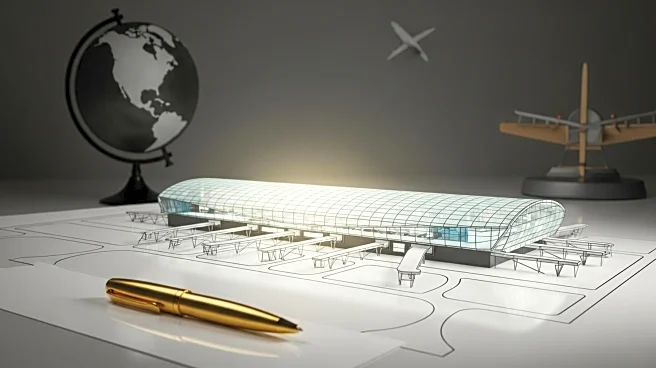What's Happening?
Qatari construction company UCC Holding has announced the signing of multiple agreements for the redevelopment of Damascus International Airport in Syria. The project involves renovating the existing terminal facilities and designing a new five-star hotel adjacent to the airport. This hotel will feature 200 premium rooms, dining and leisure facilities, and direct terminal access. Additionally, the redevelopment includes infrastructure enhancements such as the beautification of the Airport Road, which connects the Lebanon-Syria border to the airport. These improvements will incorporate upgraded entrances and exits, improved safety and connectivity, enhanced lighting, and comprehensive landscaping.
Why It's Important?
The redevelopment of Damascus International Airport by UCC Holding is significant as it represents a major investment in Syria's infrastructure amidst ongoing regional instability. This project could potentially boost Syria's economy by improving its connectivity and attractiveness to international travelers and businesses. The involvement of a Qatari firm highlights Qatar's strategic interests in expanding its influence in the region through infrastructure development. This move may also signal a shift in regional alliances and economic partnerships, potentially impacting geopolitical dynamics in the Middle East.
What's Next?
As the redevelopment progresses, it is expected that the new facilities will enhance the airport's capacity and service quality, potentially attracting more airlines and passengers. The completion of the hotel and infrastructure improvements could lead to increased tourism and business travel to Syria, contributing to the country's economic recovery. Stakeholders, including regional governments and international investors, will likely monitor the project's impact on regional stability and economic growth.
Beyond the Headlines
The redevelopment of Damascus International Airport by a Qatari firm may have deeper implications for regional politics and economic alliances. It could be seen as a step towards normalizing relations between Syria and other countries in the region, potentially leading to further economic collaborations. Additionally, the project may raise ethical questions regarding investment in a country with ongoing conflict and human rights concerns.










